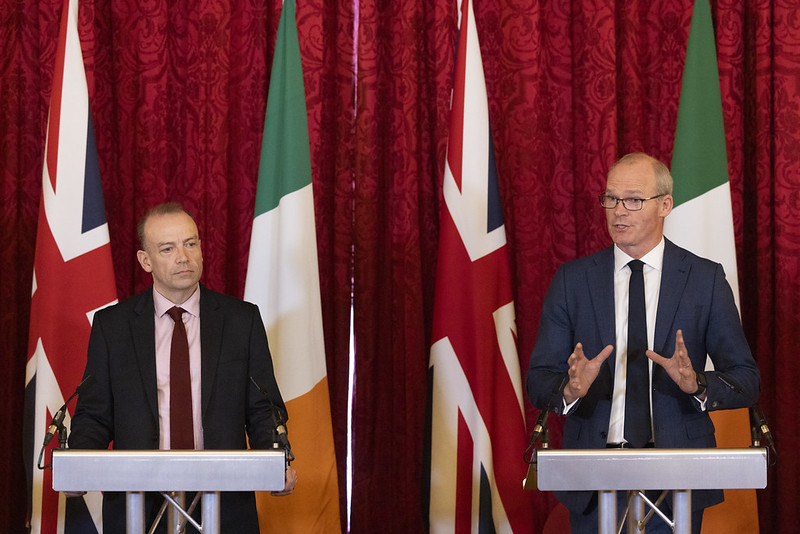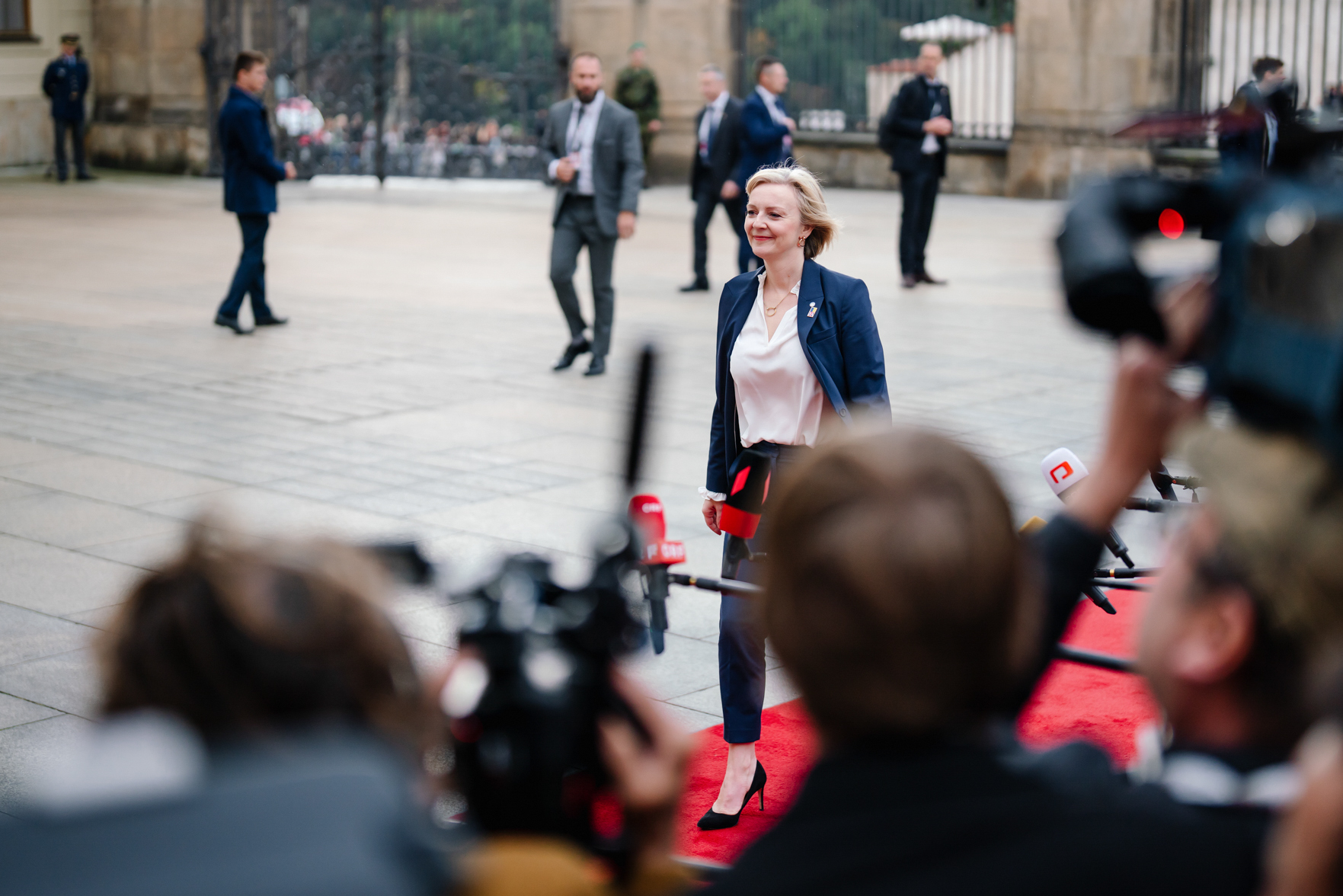Brexit & Beyond Newsletter
10 October 2022

Welcome to the 10 October 2022 Brexit & Beyond newsletter
Talks between the EU and UK on the Protocol on Ireland/Northern Ireland resumed last week, amid some speculation they could enter “the tunnel”. UK and Irish Government figures have made positive comments about the prospects for progress. The UK Government’s Northern Ireland Protocol Bill will have its second reading in the House of Lords this week. The British-Irish Intergovernmental Conference met in London last week, and the UK Foreign Minister met his Irish counterpart. The European Political Community held its inaugural meeting in Prague. Environmental groups have expressed concerns about the impact of the Retained EU Law (Revocation and Reform) Bill in Northern Ireland.
Talks on the Protocol resume
On Thursday, talks between EU and UK officials on the Protocol on Ireland/Northern Ireland resumed via videolink. On the timescale for progress, RTÉ’s Tony Connelly reports that the negotiations will take months: “The UK has floated the idea of a deal by the 25th anniversary of the GFA [Good Friday Agreement] next April; the EU would like something shorter and is concerned about the October 28 deadline to restore the NI institutions…the end of year might be a more realistic deadline.”
The UK Government says that the Protocol on Ireland/Northern Ireland needs to be changed to address practical problems facing east-west trade. The EU says it will not renegotiate the Protocol but made proposals in October 2021 to address issues raised by stakeholders in Northern Ireland. While the European Union has said the role of the European Court of Justice in overseeing the Protocol arrangements is non-negotiable, Tony Connelly suggests, “if both sides start bagging breakthroughs on other stuff they may start looking for a fudge on ECJ to get the thing over the line.” The negotiations will focus on customs checks on goods, sanitary and phytosanitary measures, VAT, state aid, and governance issues.
A delegation from the European Parliament International Trade Committee will visit Belfast on Thursday and Friday to “discuss ways to resolve the EU-UK conflict over the Northern Ireland Protocol with local political figures, business and civil society”.
NI Protocol Bill
The UK has told the European Commission that it won't speed up or slow down the Northern Ireland Protocol Bill's passage through Parliament. The Commission “made it clear that if this is a good faith negotiation the Bill will have to be paused somehow”. On 11 October, the Lords will undertake the second reading of the Northern Ireland Protocol Bill. The Lords Library has published a briefing on the Bill. The Guardian reports that peers are planning to let the Bill “squeak through [second reading] for tactical reasons.” Committee stage will take place on 25 October, “when they can try to delay the bill indefinitely with an amendment preventing it completing its House of Lords stages until an impact assessment is produced.” There are concerns about the Bill breaking international law, and the sweeping powers it gives to ministers. The Northern Ireland Human Rights Commission and the Equality Commission for Northern Ireland have published a briefing on the Bill, which raises concerns about its compatibility with Article 2 of the Protocol. In Article 2, the UK Government committed to ensuring that there will be no diminution of rights, safeguards or equality of opportunity, as set out in the Belfast/Good Friday Agreement, as a result of Brexit.
Signs of optimism
Last week various positive noises were made by political leaders in the UK and Ireland about the prospect of progress on the Protocol impasse. On Thursday, ahead of meeting with UK Foreign Minister James Cleverly, Ireland’s Foreign Minister Simon Coveney told the Dáil, “The conversations I have had with the new Secretary of State for Northern Ireland and his deputy, Steve Baker, have been warm. There is a genuine effort on the British side to try to rebuild and reconstruct relationships with Ireland, which is good. That is clearly under instruction from the Prime Minister's office because it is happening across the board.” He added, “It will not be possible to resolve all the issues linked to the implementation of the Protocol by 28 October but we could make significant progress on some of the issues that really matter to people in Northern Ireland, including the unionist and business communities.”
Taoiseach Micheál Martin said he accepted the UK’s “good faith” in efforts to find a solution and said there is a “window of opportunity” for an agreement. Tánaiste Leo Varadkar commented that “perhaps the Protocol, as it was originally designed, was a little too strict…there is some room for further flexibility for some changes that hopefully would make it acceptable to all sides.”
British-Irish Intergovernmental Conference
These comments came ahead of a meeting of the British-Irish Intergovernmental Conference in London on Friday. The Conference was established in the Good Friday Agreement “to promote bilateral co-operation at all levels on all matters of mutual interest within the competence of the UK and Irish Governments”. It discussed British-Irish cooperation, political stability, and security cooperation. The UK and Irish Governments “reaffirmed their commitment to doing everything possible to facilitate the re-establishment of the Executive by 28 October.” On Thursday evening, Simon Coveney also met UK Foreign Secretary James Cleverly for bilateral talks.

Secretary of State for Northern Ireland Chris Heaton-Harris and Ireland’s Minister of Foreign Affairs Simon Coveney | Source: Simon Dawson / No 10 Downing Street
Following the meeting, Minister Coveney said he hoped the EU and UK could “find a way of making a big step forward by end of October that can be a basis for reassuring particularly the unionist community…What we are after is a nil-all draw where everybody can walk away feeling they have not won or lost but can live with the outcome and a solution that allows Northern Ireland to move on.” NI Secretary of State Chris Heaton-Harris said, “Hopefully the Northern Ireland Bill will be redundant.” He added, “I want to be very positive about the chances of getting a negotiated solution.”
Coveney said the technical discussions had “gone reasonably well” this week. The Telegraph reports that “the tunnel” could be reopened – the name given to intense negotiations without media engagement.
Party conferences
At a fringe event at the Conservative Party Conference last week, UK Foreign Minister Cleverly said, “The tone, I think, has improved. That's always a good sign. I think there is a recognition that it's in our collective interest to get this resolved."
In her speech at the Conservative party conference, Prime Minister Liz Truss did not mention the Protocol issues. On Brexit, she said, “We are the party who got Brexit done and we will realise on the promise of Brexit. We are building an economy which makes the most of the huge opportunities Brexit offers. By the end of next year, all EU-inspired red tape will be history.”
On Saturday, the DUP held its party conference. Leader Sir Jeffrey Donaldson said he had repeatedly warned that “devolution and the Protocol were not compatible.”
European Political Community
The European Political Community (EPC) held its inaugural meeting in Prague on 6 October. It aims to “foster political dialogue and cooperation to address issues of common interest; and strengthen the security, stability and prosperity of the European continent.” The next EPC meetings will take place in Moldova, Spain and the UK. The Commons Library has published a paper on the new organisation. The meeting focused on the energy crisis, and peace and security. Mujtaba Rahman of Eurasia Group suggests the EPC’s “most important short-term achievement will be reintroducing post-Brexit Britain to the idea of European cooperation.” Prime Minister Liz Truss attended and released a statement, welcoming, “the strong show of unity against tyranny at the summit of European leaders today, as the UK secures new commitments on energy and migration.”

UK Prime Minister Liz Truss arrives at the meeting of the European Political Community | Source: European Union
Concerns about potential removal of NI’s environmental laws
Conservation groups in Northern Ireland have written to the Secretary of State for Northern Ireland and Stormont departments over their concerns with the Retained EU Law (Revocation and Reform) Bill which was introduced in the UK Parliament last month. The Bill would end the special status of retained EU law, which the Government says “will enable [it] to remove years of burdensome EU regulation in favour of a more agile, home-grown regulatory approach that benefits people and businesses across the UK.” The Bill would “sunset” the majority of retained EU law so it expires on 31 December 2023, unless preserved.
Groups, including the Northern Ireland branch of the Royal Society for the Protection of Birds (RSPB), Ulster Wildlife and NI Environment Link, say, "The unnecessary risk of losing hundreds of essential standards and regulations is made all the more acute by the ongoing lack of functioning political institutions in Northern Ireland…Without specific action by ministers to replace hundreds of laws, there is a real and unacceptable risk that environmental and public health laws that we, and society as a whole, have come to depend on will simply cease to exist after 2023.” Their letter highlights the amount of work the Bill will create for the Northern Ireland Executive. In a statement, the Department of Agriculture, Environment and Rural Affairs says its officials are monitoring the Bill’s passage through Parliament closely.
EU-UK Civil Society Forum meets
The first meeting of the EU-UK Civil Society Forum took place on 4 October. The Forum brings together the EU and UK Domestic Advisory Groups (DAGs), which were established under the EU-UK Trade and Cooperation Agreement (TCA) to advise on its implementation. Ahead of the meeting the DAGs published a joint statement, saying, “We are convinced the TCA can be a sound basis to build a stronger, more resilient and sustainable relationship with close trade, investment and cultural ties, fair competition, the respect of human rights, and high social, environmental, animal welfare and consumer protection standards for the benefit of EU and UK citizens.” The DAGs “emphasize the importance of the Protocol on Ireland/Northern Ireland to the TCA and the Belfast/Good Friday Agreement to be respected in all their dimensions. We call on both parties to address any practical issues with the Protocol through good faith discussions that should lead to a mutually agreed solution as soon as possible that protects peace, jobs, and provides prosperity for all.” Membership and further details about the UK DAG can be found here. The Dairy Council for Northern Ireland, Northern Ireland Chamber of Commerce and Industry, and Northern Ireland Council for Voluntary Action are members. More information about the EU DAG can be found here.
Other news
- The Scottish Parliament’s Constitution, Europe, External Affairs and Culture Committee has launched an inquiry looking at how devolution is changing after Brexit. In a recent report it concluded that there are “fundamental concerns which need to be addressed in relation to how devolution works outside the EU.” The committee wants to facilitate a public debate on the subject. The call for views is open until 30 November 2022.
- Trade expert Sam Lowe has published a paper on trade in goods and the Northern Ireland Protocol which considers the six border regimes facing traders in Northern Ireland and proposes measures to improve trading conditions.



